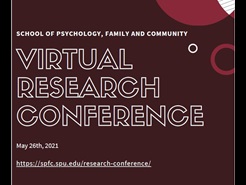Faculty Sponsor(s)
Baine Craft
Presentation Type
Event
Project Type
Literature review
Primary Department
Psychology
Description
In various disciplines (e.g., Psychology, Philosophy, Theology), self-control has been considered a uniquely human trait or even a virtue. However, self-controlled responding has been observed in experiments with nonhuman animals. For example, self-controlled responding has been studied in dogs and more recently, fish. Here we define self-controlled behavior as the choice for a larger reward that is delayed versus a smaller reward that is available sooner (i.e., impulsivity). Despite recent self-control studies in animals, no comprehensive review of this literature has been conducted. Therefore, the purpose of this study is to provide a review of recent self-control experiments in animals.
Copyright Status
http://rightsstatements.org/vocab/InC/1.0/
Additional Rights Information
Copyright held by author(s).
Included in
Self-control and impulsivity in nonhuman animals: A literature review
In various disciplines (e.g., Psychology, Philosophy, Theology), self-control has been considered a uniquely human trait or even a virtue. However, self-controlled responding has been observed in experiments with nonhuman animals. For example, self-controlled responding has been studied in dogs and more recently, fish. Here we define self-controlled behavior as the choice for a larger reward that is delayed versus a smaller reward that is available sooner (i.e., impulsivity). Despite recent self-control studies in animals, no comprehensive review of this literature has been conducted. Therefore, the purpose of this study is to provide a review of recent self-control experiments in animals.


